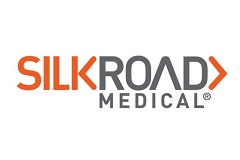 Silk Road Medical recently announced that the US Food and Drug Administration (FDA) approved expanded indications for the company’s Enroute stent to include patients at standard risk for adverse events from carotid endarterectomy (CEA). Previously, the stent was approved for use only in patients with anatomic or physiological criteria that put them at high risk of complications from more invasive surgical procedures.
Silk Road Medical recently announced that the US Food and Drug Administration (FDA) approved expanded indications for the company’s Enroute stent to include patients at standard risk for adverse events from carotid endarterectomy (CEA). Previously, the stent was approved for use only in patients with anatomic or physiological criteria that put them at high risk of complications from more invasive surgical procedures.
“This is the first time in history that a stent-based approach has demonstrated non-inferiority in stroke and death rates relative to CEA, with our TCAR [transcarotid artery revascularisation] system offering the added benefit of significantly reduced cranial nerve injury risk,” said Erica Rogers, president and chief executive officer of Silk Road Medical. “This label expansion levels a playing field once dominated by open surgical techniques, allowing an expanded number of patients and physicians access to the benefits of a less invasive treatment option.”
Silk Road Medical had previously submitted a premarket approval (PMA) supplement, which included data extracted from the Vascular Quality Initiative. The surveillance data included in the submission represented real-world outcomes in 20,264 patients considered at standard surgical risk. According to a company press release, those data demonstrated that use of Silk Road Medical’s TCAR system is statistically non-inferior in stroke and death outcomes to CEA, while showing a ninefold reduction in cranial nerve injury (2.7% vs 0.3%, p=<0.001).
“Pairing the right patient with the right treatment results in significantly improved physician and patient experiences and outcomes. I speak for the vascular community in welcoming this label expansion for TCAR and recognising this as a vital advancement in the treatment paradigm for patients at risk of stroke,” said Marc L Schermerhorn (Beth Israel Deaconess Medical Center, Boston, USA). “The decision regarding which patients to treat with TCAR is no longer restricted to patients at high surgical risk, providing a greater opportunity for the care team to pursue the less invasive approach for a broader set of their patients. At Beth Israel Deaconess, going forward, we expect that the right treatment for the majority of our atherosclerotic carotid disease patients will be TCAR.”









